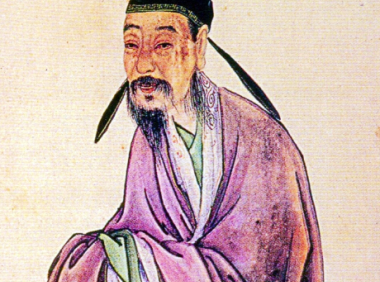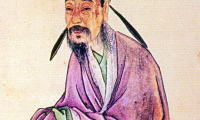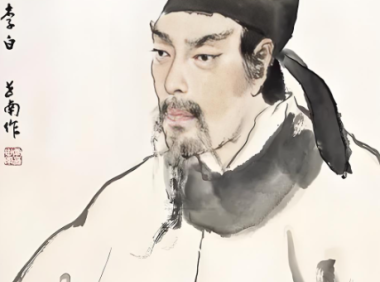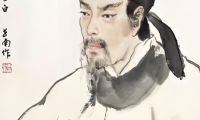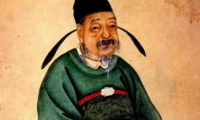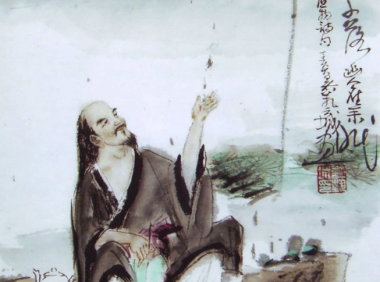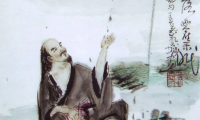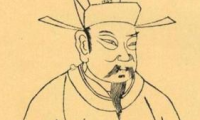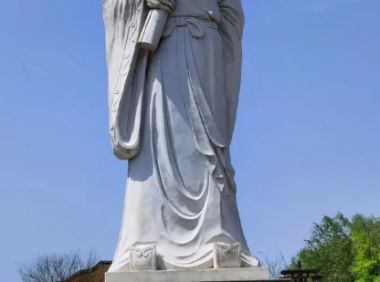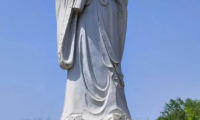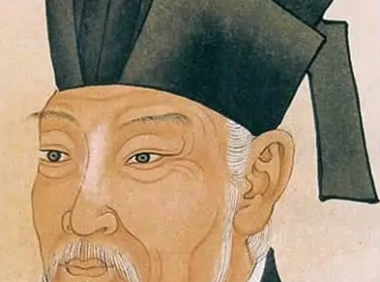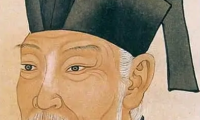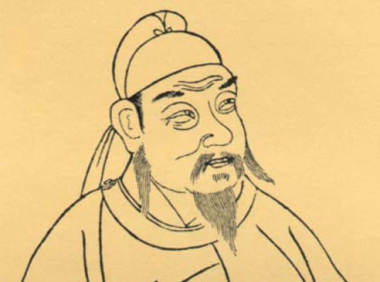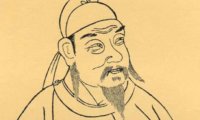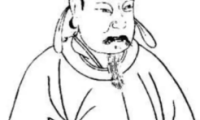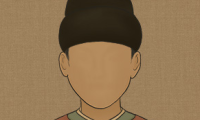-
Wang Wei: The Zhongnan Mountains
Wang Wei 终南山 王维 太乙近天都,连山到海隅。白云回望合,青霭入看无。分野中峰变,阴晴众壑殊。欲投人处宿,隔水问樵夫。 The Zhongnan Mountains O mighty peaks with Heaven linedA-rolling on to distant sea!The fleecy clouds close up from behind,Blue mists, when near, are nowhere to see.The Central Peak is where to holdAll valleys, bright and dark, in view.But where to pass the night so cold?'Cross the stream's a woodman—"How d'ye do!" hidden contents.等等...
- 0
- 0
- 92
-
Li Pai: The Yellow River Flows East Ancient Wind 11
libai 古风其十一·黄河走东溟 李白 黄河走东溟,白日落西海。 逝川与流光,飘忽不相待。 春容舍我去,秋发已衰改。 人生非寒松,年貌岂长在。 吾当乘云螭,吸景驻光彩。 The Yellow River Flows East Ancient Wind 11 Li Pai Taking a jade cup, I fill it with good wine; after coming to see you off, we two riding together under the willows, then toasting each other good-bye; you going out over the horizon maybe, and then perhaps crossing the great ocean on out to the Isle of Green; now we drink and part; no use to keep on until we are drunk. (Rewi Alley 译)...
- 0
- 0
- 81
-
Li Pai: Descending from Chungnan Mountain
下终南山过斛斯山人宿置酒 libai 李白 暮从碧山下,山月随人归。 却顾所来径,苍苍横翠微。 相携及田家,童稚开荆扉。 绿竹入幽径,青萝拂行衣。 欢言得所憩,美酒聊共挥。 长歌吟松风,曲尽河星稀。 我醉君复乐,陶然共忘机。 Descending Zhongnan Mountain and Meeting Si the Hermit Li Bai At dusk I leave the hills behind, The moon escorts me all the way. Looking back, I see the path wind Across the woods so green and gray. We come to your cot hand in hand, Your lad opens the gate for me. Bamboos along the alley stand And vines caress my cloak with glee. I’m glad to talk and drink good wine Together with my hermit friend. We sing the songs of wind and pine, And stars are set when singings end. I’m drunk and you’re merry and glad: We both forget the world is sad. (杨宪益、戴乃迭 译) Descending from Chungnan Mountain Li Pai At evening I descended from Chungnan Mountain, and it was as if the moon accompanied me; I looked around and up at the track I had come from, seeing just a line of green away up there; friends accompanied me home and at the gate a youngster opened our picket gate; through it we went on a winding path hung over with wisteria that brushed me as I passed, and I said how good a place…...
- 0
- 0
- 74
-
Li Pai: Going Up Yoyang Tower with a Friend
libai 与夏十二登岳阳楼 李白 楼观岳阳尽,川迥洞庭开。 雁引愁心去,山衔好月来。 云间连下榻,天上接行杯。 醉后凉风起,吹人舞袖回。 Going Up Yoyang Tower with a Friend Li Pai We climbed Yoyang Tower with all the scene around coming into vision; looking up the Great River seeing boats turn and enter the Tungting Lake; geese crying farewell to the river as they flew south; evening falling as if mountain tops put up the moon with their lips; and we in the Yoyang Tower as if with heads amongst the cloud, drinking wine as if the cups came from heaven itself; then having drunk our fill there blew a cold wind filling out our sleeves, it seeming as though we were dancing in time with it. (Rewi Alley 译) Ascending the Tower of Yueyang1 with Xia the Twelfth Li Bai On scenes so vast the Tower feasts our eye; The river stretches into the Lake of South2. Taking away our sorrow, wild geese fly; Green mountains throw the moon up from their mouth. Make of white cloud a comfortable bed, And pass around wine-cups in azure skies. Drunken, let cooling breezes blow and spread Our dancing sleeves which flap like butterflies. In Hunan Province. The Dongting Lake. (许渊冲 译)...
- 0
- 0
- 81
-
Li Po: Bathed and Washed
libai 沐浴子 李白 沐芳莫弹冠,浴兰莫振衣。 处世忌太洁,至人贵藏晖。 沧浪有钓叟,吾与尔同归。 Bathed and Washed Li Po ‘Bathed in fragrance, do not brush your hat; Washed in perfume, do not shake your coat: ‘Knowing the world fears what is too pure, The wisest man prizes and stores light!’ By Bluewater an old angler stat: You and I together, let us go home. (Arthur Cooper 译) Fisherman Friend Li Pai If you have washed your hair in scented water, do not dust your hat; then if you have the fragrance of the baths still on you, do not shake your clothes; no one likes one who is too good; the wise man hides his perfections; hey there, old fisherman friend1, wait for me, I’m coming along with you! 1. The old fisherman is a typical common man. (Rewi Alley 译)...
- 0
- 0
- 73
-
Chia Tao: Quatrain
Jia Dao 绝句 贾岛 海底有明月,圆于天上轮。 得之一寸光,可买千里春。 Quatrain Chia Tao At the bottom of the ocean: the moon, bright moon, round as the wheel of the sky. Just get a single hand full of this glory… And you could buy a thousand miles of spring. (J.P. Seaton 译)...
- 0
- 0
- 101
-
Chia Tao: After Finishing a Poem
题诗后 贾岛 Jia Dao 二句三年得,一吟双泪流。 知音如不赏,归卧故山秋。 After Finishing a Poem Chia Tao Those two lines cost me three years: I chant them once and get two more, of tears. Friend, if you don’t like them… I’ll go home, and lie down, in the ancient mountain autumn. (J.P. Seaton 译)...
- 0
- 0
- 105
-
Chia Tao: A Letter Sent
Jia Dao 寄远 贾岛 家住锦水上,身征辽海边。 十书九不到,一到忽经年。 A Letter Sent Chia Tao The family’s living up Brocade Creek, while I’ve struggled off to this distant sea. Of ten letters sent, maybe one gets through, and when it does, it says another year’s gone by. (J.P. Seaton 译)...
- 0
- 0
- 75
-
Wei Ying-wu: To My Cousins
Wei Yingwu 寄诸弟 韦应物 岁暮兵戈乱京国,帛书间道访存亡。 还信忽从天上落,唯知彼此泪千行。 To My Cousins Wei Ying-wu Late last year when the capital was being looted I sent letters by back roads to see if you survived your answer has suddenly fallen from the sky all we know of each other are a thousand streams of tears (Red Pine 译)...
- 0
- 0
- 65
-
Wei Ying-wu: The Call of the Cuckoo
Wei Yingwu 子规啼 韦应物 高林滴露夏夜清,南山子规啼一声。 邻家孀妇抱儿泣,我独展转何时明。 The Call of the Cuckoo Wei Ying-wu Dew drips from tall trees on a clear summer night in the hills to the south a cuckoo calls the window next door comforts her child I turn in bed and wait for first light (Red Pine 译)...
- 0
- 0
- 73
-
Feng Yen-ssu: To “Ts’ai Sang-tzu” (II)
采桑子·其二 冯延巳 马嘶人语春风岸, 芳草绵绵。 杨柳桥边, 落日高楼酒旆悬。 旧愁新恨知多少, 目断遥天。 独立花前, 更听笙歌满画船。 To “Ts’ai Sang-tzu” (II) Feng Yen-ssu A horse’s neigh and the sound of voices on a shore where the spring breeze blows; Fragrant herbs stretch on and on, There are weeping willows beside the bridge, And a wineshop banner hanging from a tall pavilion in the setting sun. Who can reckon the sum of old sorrow and new heart-ache? The distant heavens lost to sight… I stand alone beside the blossoms, And hear pipes and singing fill the painted barges once again. (Daniel Bryant 译)...
- 0
- 0
- 79
-
Feng Yen-ssu: To “Ts’ai Sang-tzu” (I)
采桑子·其一 冯延巳 小庭雨过春将尽, 片片花飞, 独折残枝, 无语凭阑只自知。 玉堂香暖珠帘卷, 双燕来归。 君约佳期, 肯信韶华得几时。 To “Ts’ai Sang-tzu” (I) Feng Yen-ssu In a tiny garden the rain is over, and spring is almost gone; Petal by petal the blossoms fly; Alone I break off a tattered spray And lean against a railing, silent, communing with myself. Incense is warm in the jade hall as beaded blinds are raised; A pair of swallows coming home… Old promises are hard to keep: How well I know the bloom of youth lasts but a little while. (Daniel Bryant 译)...
- 0
- 0
- 69
-
Feng Yen-ssu: To “Ts’ai Sang-tzu” (III)
采桑子·其三 冯延巳 西风半夜帘栊冷, 远梦初归。 梦过金扉, 花谢窗前夜合枝。 昭阳殿里新翻曲, 未有人知。 偷取笙吹, 惊觉寒蛩到晓啼。 To “Ts’ai Sang-tzu” (III) Feng Yen-ssu A wind from the west in the dead of night—latticed blinds are cold; Just returned from a far away dream, (…) past golden doors, As blossoms drop from the boughs of mimosa trees outside the window. Within the halls of Chao-yang Palace, a song newly arranged, That no one at all has ever heard. She takes up her pipes and blows a furtive note, Waking with a start the chill crickets that cry all through the night. (Daniel Bryant 译)...
- 0
- 0
- 68
-
Li He: Song of the Bronze Statue
Li He 金铜仙人辞汉歌并序 李贺 魏明帝青龙元年八月,诏宫官牵车,西取汉孝武捧露盘仙人,欲立致前殿。宫官既拆盘,仙人临载,乃潸然泪下。唐诸王孙李长吉遂作《金铜仙人辞汉歌》。 茂陵刘郎秋风客,夜闻马嘶晓无迹。 画栏桂树悬秋香,三十六宫土花碧。 魏官舝车指千里,东关酸风射眸子。 空将汉月出宫门,忆君清泪如铅水。 衰兰送客咸阳道,天若有情天亦老。 携盘独出月荒凉,渭城已远波声小。 Song of the Bronze Statue Li He In the eighth month of the first year of the Qinglong era, during the reign of Emperor Ming of Wei, the court ordered a palace officer to ride west and bring back the gilded bronze figure of an immortal holding a disc to catch dew made during the reign of Emperor Wu of Han, in order to set it up in the front court. When the palace officer removed the disc and took the statue to his carriage, the bronze figure shed tears. So Li Changji, descended from a prince of the House of Tang, wrote this song. Gone that emperor of Maoling, Rider through the autumn wind, Whose horse neighs at night And has passed without trace by dawn. The fragrance of autumn lingers still On those cassia trees by painted galleries, But on every palace hall the green moss grows. As Wei’s envoy sets out to drive a thousand li The keen wind at the East Gate stings the statue’s eyes… From the ruined palace he brings nothing forth But the moon-shaped disc of Han, True to his lord, he sheds…...
- 0
- 0
- 92
-
Po Chü-I: Reading Chuang Tzu
Bai Juyi-白居易 读庄子 白居易 去国辞家谪异方,中心自怪少忧伤。 为寻庄子知归处,认得无何是本乡。 Reading Chuang Tzu Po Chü-I Leaving home and homeland, banished to some far-off place, I wonder how it is I’m nearly free of grief and pain. Puzzled and searching Chuang Tzu for insight on returning to dwell, I realize it’s a place beyond questions: that’s our native land. (David Hinton 译)...
- 0
- 0
- 75
-
Po Chü-I: Ch’in
Bai Juyi-白居易 琴 白居易 置琴曲几上,慵坐但含情。 何烦故挥弄,风弦自有声。 Ch’in Po Chü-I Letting my ch’in stay on its little table, I sit idly, letting what I feel stay deep. Why bother to play it? In this breeze, strings sing perfectly well themselves. (David Hinton 译)...
- 0
- 0
- 70
-
Meng Jiao: For Her Son Who’ll Be Away for a While
Meng Jiao 游子吟 孟郊 慈母手中线,游子身上衣。 临行密密缝,意恐迟迟归。 谁言寸草心,报得三春晖。 For Her Son Who’ll Be Away for a While Meng Jiao Needle and thread in doting mother’s hand Turn out garments for her son out to roam the land. She puts in more stitches e’en as he leaves And frets that his homecoming may be moved back. Who says the tiny inch-tall blade of grass Can e’er repay the warm sunshine of spring? (龚景浩 译) The Wandering Son’s Song The thread from my dear mother’s hand Was sewn in the clothes of her wandering son. For fear of my belated return, Before my leave they were closely woven. Who says mine heart like a blade of grass Could repay her love’s gentle beams of spring sun? (孙大雨 译) Chant of a Roaming Son The thread in the mother’s hand, The clothes worn by the wanderlust son. The nearer the departure, The closer the stitches sown, Lest his return be further postponed. Who said the grass blade of a heart Could repay the glory of the late spring sun? (任治稷、余正 译) A Journeyer’s Song Through a kind mother’s hands passed the thread That made the clothes I journeying wear. Tightly tightly she wove them then, Dreading year…...
- 0
- 0
- 102
-
Wei Ying-wu: At Cloud-Wisdom Monastery, in the Ch’an Master’s Courtyard
Wei Yingwu 昙智禅师院 韦应物 高年不复出,门径众草生。 时夏方新雨,果药发馀荣。 疏澹下林景,流暮幽禽情。 身名两俱遣,独此野寺行。 At Cloud-Wisdom Monastery, in the Ch’an Master’s Courtyard Wei Ying-wu Exalted with age, you never leave here: the gate-path is overgrown with grass. But summer rains have come, bringing fruits and herbs into such bright beauty, so we stroll down into forest of shadow, sharing what recluse birds feel at dusk, freed even of our names. And this much alone, we wander the countryside back. (David Hinton 译)...
- 0
- 0
- 64
-
Li Shan-fu: The Temple of Hsiang Yü
项羽庙 李山甫 为虏为王尽偶然,有何羞见汉江船? 停分天下犹嫌少,可要行人赠纸钱? The Temple of Hsiang Yü1 Li Shan-fu Captive or king, it’s all a matter of chance. Why ashamed to see Han boats on the river? Contesting for the empire, the world wasn’t big enough; Would you now care for offerings of paper money from a traveler? 1. Hsiang Yü (232-202 B.C), the defeated king of Ch’u. (Irving Y. Lo 译)...
- 0
- 0
- 68
-
T’ang Yen-ch’en: A Walk in the Country
野行 唐彦谦 蝶恋晚花终不去,鸥逢春水固难飞。 野人心地都无著,伴蝶随鸥亦不归。 A Walk in the Country T’ang Yen-ch’en Butterflies in love with evening flowers will not leave until the very end. Gulls meeting spring waters find it sorely hard to fly away. A man in the country, I keep no address at all under my heart; A companion of butterflies, a follower of gulls, I will not go home either. (Edward H. Schafer 译)...
- 0
- 0
- 79
-
Li Chiao: Ballad of Fen-yin
汾阴行 李峤 君不见昔日西京全盛时,汾阴后土亲祭祀。 斋宫宿寝设储供,撞钟鸣鼓树羽旂。 汉家五叶才且雄,宾延万灵朝九戎。 柏梁赋诗高宴罢,诏书法驾幸河东。 河东太守亲扫除,奉迎至尊导鸾舆。 五营夹道列容卫,三河纵观空里闾。 回旌驻跸降灵场,焚香奠醑邀百祥。 金鼎发色正焜煌,灵祗炜烨摅景光。 埋玉陈牲礼神毕,举麾上马乘舆出。 彼汾之曲嘉可游,木兰为楫桂为舟。 櫂歌微吟彩鹢浮,箫鼓哀鸣白云秋。 欢娱宴洽赐群后,家家复除户牛酒。 声明动天乐无有,千秋万岁南山寿。 自从天子向秦关,玉辇金车不复还。 珠帘羽扇长寂寞,鼎湖龙髯安可攀。 千龄人事一朝空,四海为家此路穷。 豪雄意气今何在,坛场宫馆尽蒿蓬。 路逢故老长叹息,世事回环不可测。 昔时青楼对歌舞,今日黄埃聚荆棘。 山川满目泪沾衣,富贵荣华能几时? 不见只今汾水上,唯有年年秋雁飞。 Ballad of Fen-yin Li Chiao Haven’t you seen in olden days when the western Capital was in full glory, His Majesty himself made sacrifice to the Earth at Fen-yin. In the fasting room he spent the night, set out the offering, Then they rang bells, beat the drums, planted the feathered banners. The House of Han’s fifth generation, brilliant and bold, Who banqueted the hosts of spirits, who brought the barbarians to court. And when the great feast and poem session at Po-liang was over An edict was made and the Royal Coach went on tour to Ho-tung. The Governor of Ho-tung himself swept the region clean, Humbly welcomed the Most High, led the belled palanquin. Set out as guards, Imperial Armies lined all the roads, The three River Provinces permitted to watch, their villages emptied. Banners circled, His Majesty halted on the field where the spirits come down, Incense was burned, libations offered, to invite a hundred blessings. The golden tripod’s beauty shone forth its aureate sheen, The spirits and Earth God shimmered, unfurling their radiance.…...
- 0
- 0
- 56
-
Ma Tsu-Jan: Ut Melius
诗二首 马自然 昔日曾随魏伯阳,无端醉卧紫金床。 东君谓我多情懒,罚向人间作酒狂。 何用烧丹学驻颜,闹非城市静非山。 时人若觅长生药,对景无心是大还。 Ut Melius Ma Tsu-Jan In youth I went to study Tao at its living fountain-head, And then lay tipsy half the day upon a gilded bed. “What oaf is this,” the Master cried, “content with human lot?” And bade me to the world get back and call myself a Sot. But wherefore seek immortal life by means of wondrous pills? Noise is not in the market-place, nor quiet on the hills. The secret of perpetual youth is already known to me: Accept with philosophic calm whatever fate may be. (H. A. Giles 译)...
- 0
- 0
- 74
-
Sheng Xiaocong: A Turkic Santai Song
突厥三台 盛小丛 雁门山上雁初飞,马邑阑中马正肥。 日旰山西逢驿使,殷勤南北送征衣。 A Turkic Santai Song In the Wild-goose Range, above the pass, wild geese begin to fly. Warhorses in Horse-town’s stables grow sleek and strong. Day fades in the West-Ridge borderlands: you meet army couriers, Come up from the south, taking pains with winter uniforms sent to the north. (Jeanne Larsen 译)...
- 0
- 0
- 77
-
Jia Zhi: Spring Thoughts
春思·其一 贾至 草色青青柳色黄,桃花历乱李花香。 东风不为吹愁去,春日偏能惹恨长。 Spring Thoughts Jia Zhi Under the light yellow willow twigs are grasses verdant, Peach blossoms flourish and plum flowers are fragrant. Why can’t you the east wind blow the worries over me? The sight of spring just causes my untold melancholy. (刘军平 译)...
- 0
- 0
- 74













